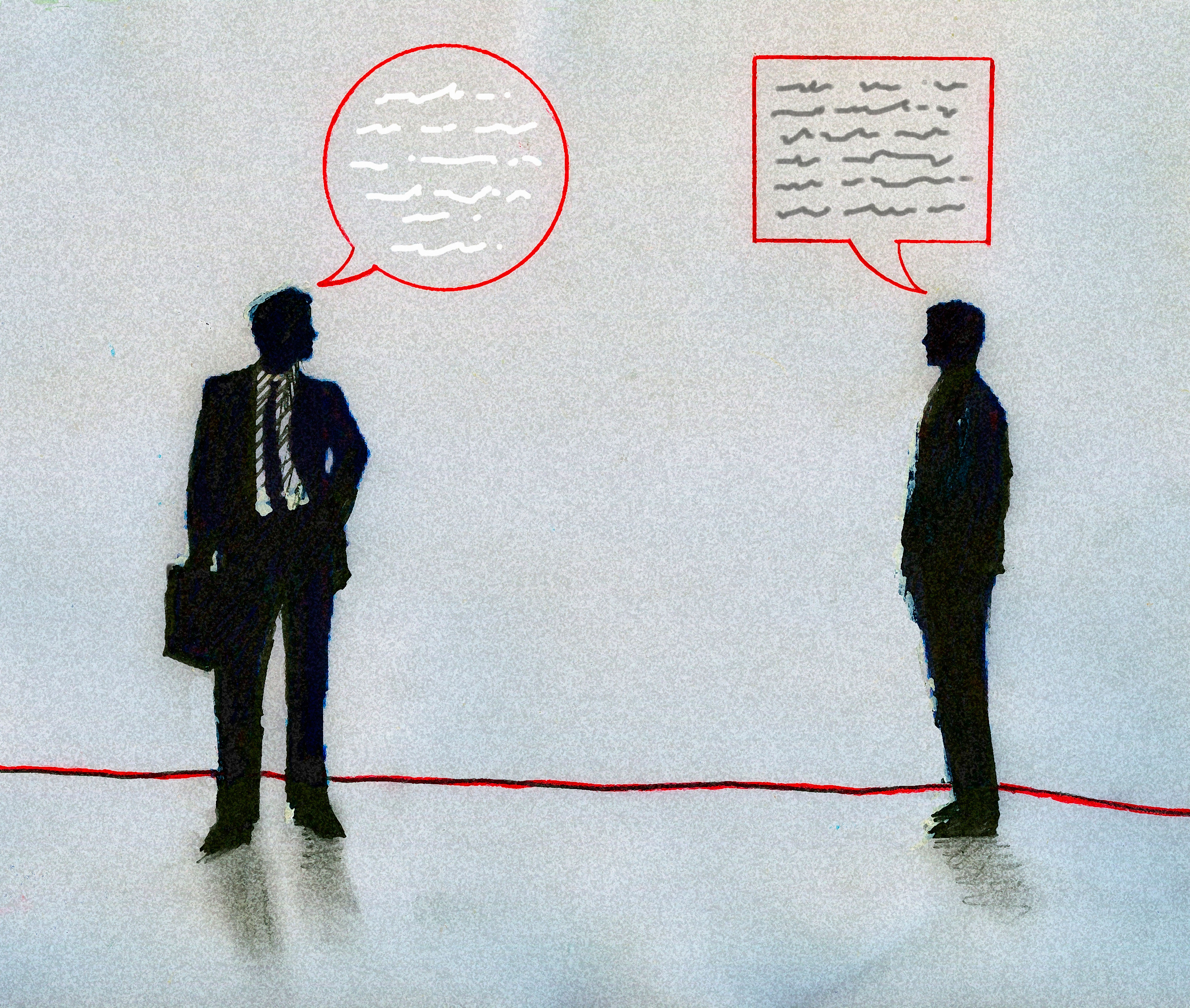Of course language is essential to class. Take it from an Englishman.
David Brooks was right


A free daily email with the biggest news stories of the day – and the best features from TheWeek.com
You are now subscribed
Your newsletter sign-up was successful
I have to confess I have no idea what a Pomodoro or Padrino entails, nor a soppressata or capicollo, but as a seasoned, sophisticated British traveler I find that pointing at the menu and shouting tends to get the message across to foreigners.
Yet not everyone is such a homme du monde as I am, like the poor soul who David Brooks took to lunch one day.
Insensitively, I led her into a gourmet sandwich shop. Suddenly I saw her face freeze up as she was confronted with sandwiches named "Padrino" and "Pomodoro" and ingredients like soppressata, capicollo and a striata baguette. I quickly asked her if she wanted to go somewhere else and she anxiously nodded yes and we ate Mexican. [The New York Times]
Brooks was writing about the subtle barriers placed by America's elites in order to exclude outsiders, and his anecdote led to much hilarity on Twitter, a social media platform that is popular precisely because it is so hierarchical, with follower counts, blue ticks, and numerous and subtle biographical status-signifiers.
The Week
Escape your echo chamber. Get the facts behind the news, plus analysis from multiple perspectives.

Sign up for The Week's Free Newsletters
From our morning news briefing to a weekly Good News Newsletter, get the best of The Week delivered directly to your inbox.
From our morning news briefing to a weekly Good News Newsletter, get the best of The Week delivered directly to your inbox.
Throughout history, food and the manners that surround it have always been important class markers. There's a reason why the words for the stuff served at the table — beef, pork, mutton — bears no resemblance to the names of the animals they originate from — cow, pig, sheep. The latter are Old English while the former are French in origin, reflecting that language's prestige status after the Norman Conquest and France's cultural dominance in the Middle Ages. No doubt when London's first 'cook-shop' opened in the 12th century, with 'coarser meats for the poor, more delicate for the rich, of game, fowls, and small birds,' there must have been a Tostig or Ethelred confused that he couldn't get a cow sandwich.
In England knowledge of our neighbor's language has since been a status signifier — in fact, British passports were even originally issued in French, rather than English, which is why I think the Brexiteer promise to return to the blue passports of my parents' childhood is not reactionary enough. That the English working class have an intense dislike of all things French, and go out of their way to mispronounce French words, is partly due to internal class hatreds.
French has long since declined in importance, but the rules of social hierarchy have become far, far more complicated since the BoBos took charge of the English-speaking world.
To take an example, back in the late 19th century, Britain's long-established Sephardic Jewish community expanded the Jews Free School into London's East End to educate the children of Eastern European immigrants. They were worried that the arrival of large numbers of refugees from Tsarist Russia with alien manners and customs would lead to widespread anti-Semitism in Britain. The school's boast was that they could "take a Russian or Polish boy and turn him into an English gentleman," something they did very successfully — it's still among the top 1 percent of English schools.
A free daily email with the biggest news stories of the day – and the best features from TheWeek.com
And yet they could do this because in the 1890s everyone knew what was meant by "English gentleman." There was a certain code attached — clothes, manner, speech patterns, forms of behavior — and not only did everyone recognize these signals, but high-status people gave off the cues that these were good things, so copy them. An English gentleman was, say, the wartime actor Leslie Howard — dapper, polite, well-spoken, upper class in manner, and whose grandfathers happened to be called Steiner and Blumberg.
When I was growing up in multiethnic inner London in the 1980s and '90s, our teachers would have just laughed at the idea of "an English gentleman." "What does 'English' mean?" and "who defines 'gentleman?'" would have been the obvious responses, all of which would make them sound reasonably clever, because paradoxically these opinions are themselves status signifiers. Citing Benedict Anderson or Eric Hobsbawn on the essential meaninglessness of national identity is a high-status signal just as waving the St. George's Cross or Stars and Stripes is the opposite.
But these signals are of little help to children whose parents arrived the previous month from Bangladesh and have no idea how to navigate their new society. Learning the language is one thing, but getting through all the nuances is the really hard part, especially when it comes to elite institutions which lay heavy emphasis on soft skills.
It comes down to cues, and the more subtle a cue, the harder it will be for less educated people to pick up on them. So now it is still possible to become a high-status Englishman, but it is far less clear-cut and only those really in the know tend to understand what it entails. The cruelty is that societies as complex as ours are relentlessly unforgiving to the less educated, or at least the less skilled at manipulating others or navigating social situations.
This also comes down to Charles Murray's criticism that the upper class don't preach what they practice; that while they tend to remain in monogamous relationships and otherwise make wise life decisions and plan ahead, they don't emphasize these actions as things to imitate. But then why would they? Lifestyle scolding — as opposed to opinion scolding, as Murray has found out — is considered déclassé, perhaps because the wealthy and better-connected can afford to make mistakes with fewer risks.
To use another Italian word you can repeat to impress your college-educated friends, the Anglo ruling classes like to express a certain sense of Sprezzatura, i.e. the pretense of nonchalance and even laziness while in fact working extremely hard at climbing the ladder.
Sprezzatura has become the hallmark of a society that is not just hierarchical but status-obsessed to the point of panic. If we really want society to be fairer we need to start spelling things out a little bit — in plain English.
Ed West is a journalist and author in London who writes regularly for the Spectator. He would like to plug two history books he has out this summer aimed at young adults.
-
 ‘Restaurateurs have become millionaires’
‘Restaurateurs have become millionaires’Instant Opinion Opinion, comment and editorials of the day
-
 Earth is rapidly approaching a ‘hothouse’ trajectory of warming
Earth is rapidly approaching a ‘hothouse’ trajectory of warmingThe explainer It may become impossible to fix
-
 Health insurance: Premiums soar as ACA subsidies end
Health insurance: Premiums soar as ACA subsidies endFeature 1.4 million people have dropped coverage
-
 Epstein files topple law CEO, roil UK government
Epstein files topple law CEO, roil UK governmentSpeed Read Peter Mandelson, Britain’s former ambassador to the US, is caught up in the scandal
-
 Iran and US prepare to meet after skirmishes
Iran and US prepare to meet after skirmishesSpeed Read The incident comes amid heightened tensions in the Middle East
-
 Israel retrieves final hostage’s body from Gaza
Israel retrieves final hostage’s body from GazaSpeed Read The 24-year-old police officer was killed during the initial Hamas attack
-
 China’s Xi targets top general in growing purge
China’s Xi targets top general in growing purgeSpeed Read Zhang Youxia is being investigated over ‘grave violations’ of the law
-
 Panama and Canada are negotiating over a crucial copper mine
Panama and Canada are negotiating over a crucial copper mineIn the Spotlight Panama is set to make a final decision on the mine this summer
-
 Why Greenland’s natural resources are nearly impossible to mine
Why Greenland’s natural resources are nearly impossible to mineThe Explainer The country’s natural landscape makes the task extremely difficult
-
 Iran cuts internet as protests escalate
Iran cuts internet as protests escalateSpeed Reada Government buildings across the country have been set on fire
-
 US nabs ‘shadow’ tanker claimed by Russia
US nabs ‘shadow’ tanker claimed by RussiaSpeed Read The ship was one of two vessels seized by the US military
